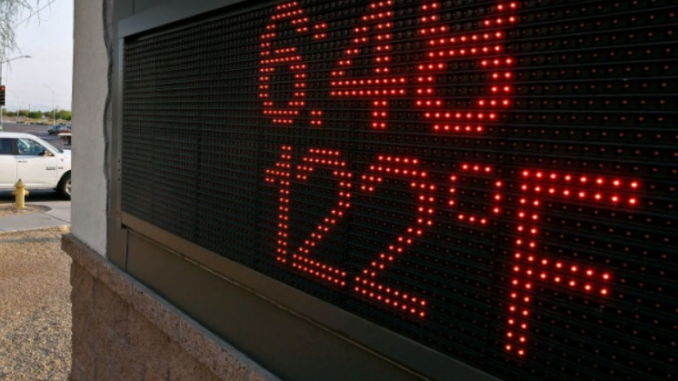
A sweltering tent city of hundreds offers little relief in downtown Phoenix, where thousands of homeless people struggle to stay alive as triple-digit summer temperatures arrive in the nation’s most blistering big city.
According to The Associated Press, pandemic-era evictions and rising rents have pushed hundreds more people out on the scorching streets, which become unnaturally quiet when temperatures hit their highest point in the midafternoon.
During a heat wave earlier this month, temperatures rose to 114 degrees, while highs last year reached 118 degrees, the news outlet reports.
”During the summer, it’s pretty hard to find a place at night that’s cool enough to sleep without the police running you off,” Chris Medlock, a homeless Phoenix man known as ”T-Bone,” told the AP.
Medlock carries all he owns in a small backpack and regularly sleeps in a park or a nearby desert preserve to avoid the crowds.
”If a kind soul could just offer a place on their couch indoors, maybe more people would live,” he said at a dining room where homeless people can find shade and get a free meal.
According to the AP, more weather-related deaths are caused by excessive heat in the U.S. than flooding, hurricanes and tornadoes combined, and heat contributes to about 1,500 deaths every year across the country.
Advocates estimate that about half of heat-related deaths are homeless people.
As climate change drives rising temperatures nearly everywhere, they are combining with severe drought in some places to create longer, more frequent and more extreme heat waves, according to the AP.
As a result, the last few summers have been some of the hottest ever recorded.
In Phoenix, 339 people died from heat-related causes last year, including at least 130 homeless people.
”If 130 homeless people were dying in any other way it would be considered a mass casualty event,” Kristie L. Ebi, a professor of global health at the University of Washington, told the AP.
Climate scientist David Hondula, director of Phoenix’s new Office of Heat Response and Mitigation, said that more solutions are needed to protect vulnerable populations from dangerous weather, especially the homeless, who are about 200 times more likely to die from heat-associated causes.
”As temperatures continue to rise across the U.S. and the world, cities like Seattle, Minneapolis, New York or Kansas City that don’t have the experience or infrastructure for dealing with heat have to adjust as well,” Hondula told the AP.
Officials and advocates in Phoenix are optimistic that a recently opened 200-bed shelter for homeless people will prevent deaths this summer.
Mac Mais, 34, who hasNewsmax been homeless off and on since he was a teenager, was one of the first to move in.
”It can be rough,” Mais told the AP. ”I stay in the shelters or anywhere I can find. Here, I can actually rest, work on job applications, stay out of the heat.”
Via Newsmax
